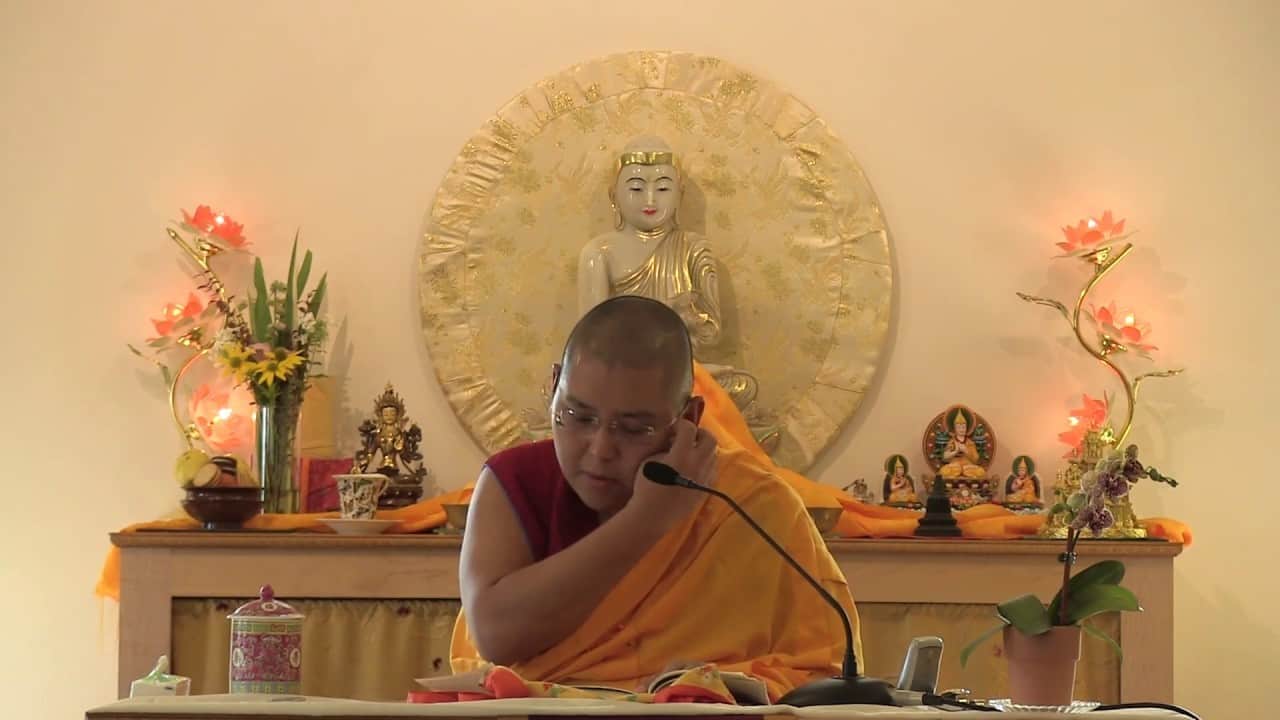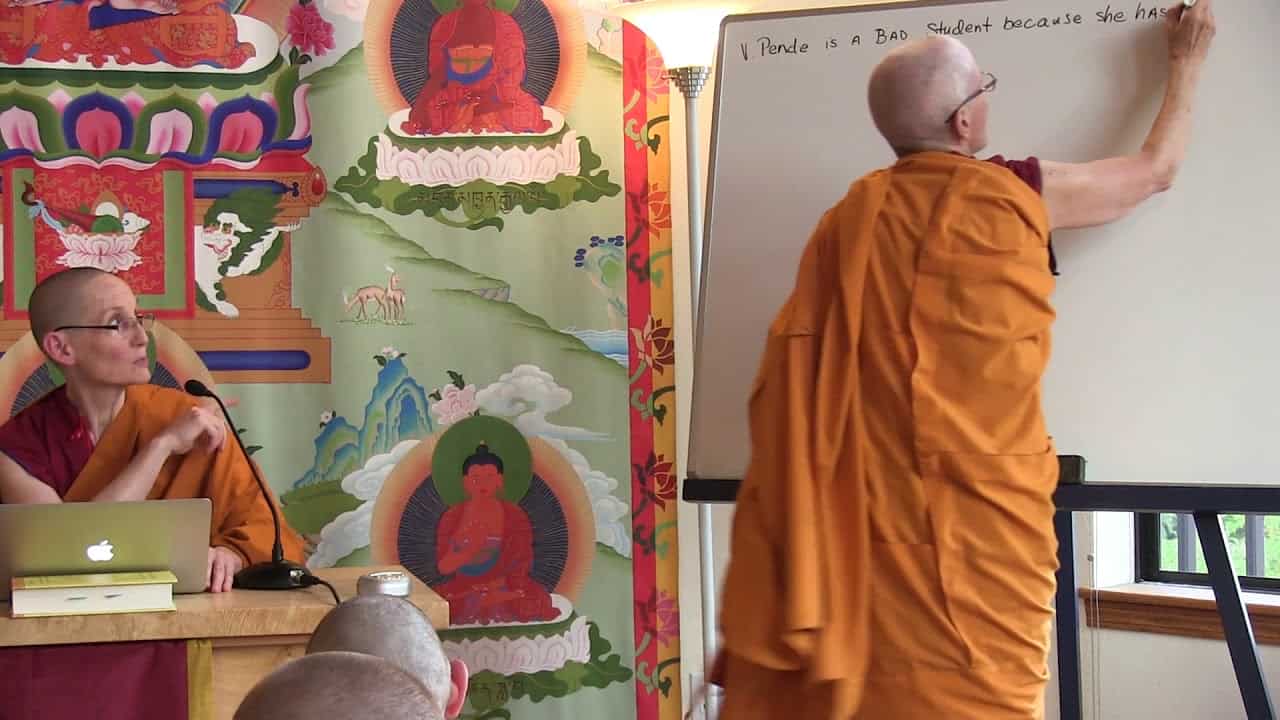Seeking a qualified spiritual teacher to guide us

Because our future lives’ happiness, liberation, and enlightenment depend on how we practice, it is important to be guided by compassionate and wise teachers. If reading Dharma books and studying by ourselves were sufficient, then the Buddha wouldn’t have presented in detail how to relate to a spiritual teacher. Not everyone who has the title “teacher” necessarily is a qualified teacher. Before accepting someone as our spiritual mentor, we should check his or her qualities. We should also analyze our own attitude and ascertain if we have the ability to train according to this mentor’s manner of teaching and to regard him/her according to the level of practice.
There are three types of spiritual teacher, according to our level of practice and the subjects they teach us:
- A spiritual mentor who leads us to take refuge in the Three Jewels and follow the vows of individual liberation, i.e. the five lay precepts, novice monastic vow, full ordination vow
- A Mahayana mentor who teaches us how to develop bodhicitta and gives us the bodhisattva vow
- A Vajrayana mentor who gives us tantric initiation and instructs us on tantric practice
Since the three types of spiritual mentor and the way of relation to them are progressively more exacting, the student or disciple who relies on them must have better and better qualities as well.
A. Qualities to look for in Vinaya spiritual mentors, i.e. those who lead us to take refuge, teach us ethical discipline, and give us the vows of individual liberation:
- Compassion for people who are suffering.
- Attendants with good qualities.
- Willing to help their disciples with material and teachings.
- Pure ethics; they keep the precepts they’ve taken.
- Knowledge of the Three Baskets of scriptures: Vinaya, Sutra, Abhidharma
- Ability to give any of these teachings at a suitable time to suitable disciples
B. Qualities to look for in a Mahayana mentor:
- Subdued physical and verbal behavior through practicing the higher training in ethics
- Subdued mind through practicing the higher training in concentration
- Very subdued mind through practicing the higher training in wisdom
- More knowledge in verbal and realizational Dharma than student
- Richness in verbal doctrine, i.e. has studied widely and has vast scriptural knowledge
- Richness in the realizational doctrine, i.e. deep, stable realization of emptiness
- Joy and enthusiasm for teaching
- Ability to express him/herself clearly so that students understand the point of a teaching
- Loving concern and compassion for students, teaches with pure motivation
- Willing to put up with the difficulties of guiding others; isn’t discouraged when students don’t practice diligently
If we can’t find teachers with all ten qualities, then find ones with as many as possible. Look especially for qualities 1, 2, 3, 6, 9.
If not that, then seek a teacher who at least has:
- More good qualities then bad ones
- Thinks more of future lives than this one
- Holds others more important than themselves
To examine potential teachers’ qualities:
- Observe their behavior.
- Check: Does the teachings they give correspond to the general Buddhist approach?
- Ask other students about them.
- Observe their students: Are they sincerely trying to practice? Or is there a big scene with jealousy and rivalry among students?
- Do they have good relationships with their own teachers?
- Do they have the oral transmission and lineage of the texts and practices that they teach?
- Are they able to give a student something that helps now? Are they are sensitive and skillful in meeting needs of students?
- Do they teach happily?
- Are they helpful and compassion, or do they seem to seek money, respect, or fame?
C. Qualities of a Vajrayana spiritual mentor:
- Has deep experience of the determination to be free, the altruistic intention, and the correct view of emptiness
- Has received the empowerments he gives from a qualified Vajrayana guru, has completed the appropriate retreat, and has done the fire puja at the end of the retreat
- Is familiar with the rituals involved in giving empowerment
- Is familiar with the meditation on that deity
- Has a proper understanding of Vajrayana in general and of the particular practice in specific
- Is skilled in doing the self-empowerment
Qualities of the student
To make ourselves proper vessels to receive the Dharma teachings, we need to develop the following qualities through practicing the Dharma:
- Open-minded, not overwhelmed with attachment and aversion, and free from preconceptions
- Discriminating intelligence
- Genuine interest, commitment, and wish to understand and experience the path
The better we are able to listen to teachings, the more we’ll benefit from them. Examine how you listen, and think of ways to increase your listening ability.
- Do you listen attentively, or do you daydream and think about other things?
- Do you remember what you hear, or do you neglect to think about the teachings while you’ve hearing them and afterwards as well?
- Do you listen with a kind motivation, to benefit yourself and others, or do you listen with cynical ears seeking to criticize or with the motivation to use your knowledge of the teachings for worldly gain?
- Do you intend to practice what you hear or do you just seek “blessing” by being in the teacher’s presence.
To develop good listening, it’s helpful to regard:
- Oneself as a sick person
- The teacher as a skilled doctor
- Dharma as the medicine
- Practicing the Dharma as the way to be cured
- Buddha as a holy being whose medicine of Dharma is non-deceptive
- The methods we learn as worthy. Thus we pray they exist and flourish
The advantages of relying on our spiritual teachers
After choosing teachers, relying on them properly benefits us. By reflecting on the following benefits, we become inspired to develop good relationships with our mentors.
- We accumulate positive potential by making offerings to our spiritual mentors, serving them, and practicing the Dharma teachings they give us. Thus we become closer to enlightenment.
- By following the Dharma teachings our spiritual teacher gives, we are mindful of what we are thinking, feeling, saying, and doing in our daily lives and observe ethical discipline. Thus harmful forces and misleading friends are unable to affect us.
- Our afflictions and faulty behavior will decrease.
- We’ll gain meditative experiences and stable realizations.
- Because of valuing our present teachers, we create the karma to meet fine spiritual teachers in future lives.
- We won’t have an unfortunate rebirth.
- All our temporary and ultimate goals will be realized.
The disadvantages of improper reliance or of angrily disavowing our spiritual mentors
After we select someone as our spiritual mentor, if we later, with an angry, critical mind, disavow them as our teacher, disadvantages accrue:
- We run the risk of discarding all the wise advice and practices that they gave us, i.e. we leave behind the very practices which can help us avoid unfortunate rebirths, attain liberation, and enlightenment. Thus we will wander in cyclic existence for a long time.
- Our spiritual masters have been extremely kind to show us the path to enlightenment. By angrily or arrogantly disregarding this kindness, we turn away from those who help us the most. Thus we create the karma to have many unfortunate rebirths.
- Although we may try to practice tantra, we won’t attain enlightenment
- Our mind remains stuck in hurt and anger; we become cynical. Such attitudes prevent us from engaging in spiritual practice.
- We won’t develop any new qualities or siddhis and what we have developed will decline
- Because we’ve stopped practicing, it will be easy for negative karma to ripen and for us to experience unwished for events
- Because of angrily ignoring our teachers now, we create the karma to lack spiritual teachers in future lives.
How to rely on our teachers with our thoughts
The way we regard a mentor depends on whether he or she is our Vinaya, Mahayana, or Vajrayana spiritual mentor:
- Vinaya mentor. Regard this person as an elder in the tradition, one who knows more than we, one who represents the Buddha by teaching us the Dharma.
- Mahayana mentor. Regard this person as similar to the Buddha in that the positive and negative karma we create by offering, etc. to him or her is similar to that we create by offering, etc. to the Buddha.
- Vajrayana mentor. Regard this person as the Buddha. In tantra, we try to see all beings as deities and all environments as pure lands, so it would be absurd to think we and others are Buddhas but our teachers are not.
By having proper respect and confidence in our spiritual mentors, we will listen to the teachings they give with our full attention, pay heed to their guidance, and practice according to their instructions.
To train our mind to regard our spiritual mentors in the proper light, reflect on
- Their good qualities and knowledge of the Dharma and how we benefit from these
- The role they play in our lives. By their leading us on the path, our lives have improved. We have created positive potential and learned the Dharma. We get along better with others. All the benefits we’ve reaped from practicing the Dharma is due to their teaching and guiding us.
- Their kindness in teaching us. They often have to travel, stay in unfamiliar places, be separated from their teachers and community, and interrupt their own practice in order to teach us. We make many mistakes and sometimes treat our teachers poorly. Nevertheless, they continue to guide us.
- Our teachers are the media for conveying the Buddha’s teachings and enlightening influence to us. If Shakyamuni Buddha were to appear and teach us right now, he wouldn’t say anything different what than our spiritual masters are teaching us.
To rely on our spiritual teachers through our actions
- Make offerings. This enables our teachers to have food, clothing, shelter, and medicine. In this way, we also support the Dharma projects, which benefit sentient beings, that they undertake.
- Offer our service and help, and pay respect. By helping our teachers with their Dharma works, those projects that benefit many people succeed and progress. By helping with daily chores, we free our teachers to use their unique skills in other ways. By respecting our teachers’ qualities, we become more open to develop those same qualities. Our respect shouldn’t be stiff and unnatural, but according to the culture and our teachers’ wishes.
- Practice according to their instructions. This is the best offering. By practicing well, we attain fortunate rebirths, liberation, and enlightenment. This is exactly what our teachers want: for us to be happy and to help others progress on the path to lasting happiness.
When there are difficulties in our relationship with our spiritual masters
Look at our own attitudes. The disciple who likes to go to bed early finds fault in the teacher who wants him/her to stay up late. Is our difficulty because our buttons are getting pushed, our limits are being stretched, or our preconceptions and expectations are being smashed? If so, it is our attitudes that need to be changed.
However, we must not whitewash actions that are unethical or harmful to the existence of the Dharma. In the scriptures, it says that if our spiritual master tells us to act unethically we can respectfully refuse.
Similarly, if our teachers tell us to do something that seems unwise according to the culture or the situation, we can respectfully tell them and can decline to do those things. We can discuss our doubts and difficulties about their actions with them with an attitude of care, not spiteful criticism.
If it comes to a point where we have great difficulty with a teacher, we keep a distance, and yet retain our gratitude for the ways in which they have helped us in the past.
The four reliances put the purpose of relying on a spiritual teacher in perspective:
- Don’t rely simply on the person of the teacher, but on what he or she teaches.
- Don’t rely simply on the sound of the teachings, how well the mentor teaches, or how enjoyable or amusing the teachings are, but on their meaning.
- Don’t rely simply on the teachings requiring interpretation but on the definitive teachings (on emptiness).
- Don’t rely simply on the definite meaning as found by a dualistic consciousness but on non-conceptual wisdom.
Through properly cultivating relationships with our teachers, our final goal is the realize the non-conceptual wisdom in our own mindstreams.
Venerable Thubten Chodron
Venerable Chodron emphasizes the practical application of Buddha’s teachings in our daily lives and is especially skilled at explaining them in ways easily understood and practiced by Westerners. She is well known for her warm, humorous, and lucid teachings. She was ordained as a Buddhist nun in 1977 by Kyabje Ling Rinpoche in Dharamsala, India, and in 1986 she received bhikshuni (full) ordination in Taiwan. Read her full bio.


